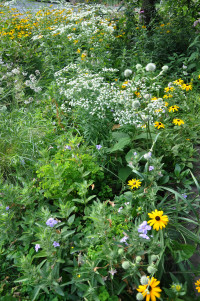Introduction to Biomimicry, Interactive Workshop: Sunday, Nov 9, 2014, 2:00-4:00pm, Oak Park Conservatory, 615 Garfield St. Have you ever wondered how we will make the leap from today to our sustainable future? Biomimicry, the practice of learning from nature to solve human problems, is emerging as a powerful and disruptive tool for creating sustainable design and systemic transformation.
"Birds, Bees & Butterflies Native Garden Tour" gets enthusiastic response
The September 7th Birds, Bees & Butterflies: A Native Garden Tour hosted by West Cook Wild Ones and Green Community Connections drew more than 140 experienced and beginner native plant gardeners and those wanting to learn what this was all about. They came from near (Oak Park, River Forest, Forest Park, Berwyn and Cicero) and farther—Plainfield, Downers Grove, Elk Grove Village and various parts of Chicago — to visit 11 residential and public gardens. More than 40 homeowners, master gardeners, volunteers, sponsors and Forest Preserve staff members also helped to make the afternoon a rich, educational - and fun! - event. The West Cook Wild Ones Wildlife Corridor also received a lot of attention at the event, and more people pledged their gardens to be part of it. The Wildlife Corridor is envisioned as a contiguous swath (at least 2 per block) of native gardens in residential and public spaces from Columbus Park in Chicago to Thatcher Woods in River Forest. Watch for more detail and ways to be involved in this unique and important project which will be coming soon.
After the garden tour, we informally surveyed participants and volunteers. We thought we'd share some of their enthusiasm, in hopes that through the upcoming, long winter, you might get inspired to plan some new native plantings in your own yard:
photo (20)
“It was reaffirming to see that native garden lovers are so aware of the need to use non-toxic products to help their gardens grow!”
“It inspired my sister [who was visiting from Pennsylvania] to start a garden!”
“I was reminded how important it is to see other people’s gardens and share information, as we can always learn more.”
“The children (and adults!) really enjoyed the impromptu live insect displays, like the katydid I found on my car bumper and the caterpillar found in the forest preserve garden. We provided them a small habitat for the day and released them at the end of the event.”
“The aliveness of the gardens seemed to energize the people that visited them. We went away smiling after watching the butterflies, bees and birds in the gardens.”
“Even the most experienced native gardener I know came back telling of seeing a rain garden on the tour and being emboldened to try one in his own gardening.”
“We want to host a garden tour like this one in our town!”
Read Ginger Brown Vanderveer's (West Cook Wild Ones co-founder) article on what native gardening means to her. She led 28 participants on a guided bike tour of six of the gardens during the event.
Stay tuned for more native gardening events next spring:
One Earth Film Fest showing of “Hometown Habitat,” in March 2015
Wild Ones Native Plant sale in May
Special guest speaker, Doug Tallamy, author of Bringing Nature Home, will come in May to share his unique perspective on bringing nature to urban areas as our rural lands become more developed or inhospitable due to industrial agriculture methods and increased use of pesticides.
“Unless we modify the places we live, work and play to meet not only our own needs, but the needs of other species as well, nearly all species of wildlife native to the United States will disappear forever. . . There is, however, a way out of this mess . . . Evidence suggests that . . . most species could live quite nicely with humans if their most basic ecological needs were met.” — Douglas W. Tallamy, Bringing Nature Home
BlackSwalltailMaleGinger3.
Walking the Talk: Douglas Chien's Urban Native Garden
Douglas Chien's Oak Park garden is attractive, colorful and full of life — and full of native plants. His garden was one of eleven featured on the September 7th, Birds, Bees & Butterflies native garden tour, which was co-sponsored by Green Community Connections and West Cook Wild Ones. In fact, many birds (including a female goldfinch), bees and quite a few species of butterflies appeared in his garden that day. Plus, more than 70 people came through for a tour. Douglas, the Advocates' Network Manager with Friends of the Forest Preserves, explained to visitors how he created his native plant oasis in the heart of West Cook County. About 12 years ago, Douglas and his partner Michele Gurgas bought their Oak Park home on a corner lot, which had a traditional landscape highlighted by lawn and two large American elm trees gracing the parkways. But within the year, the trees succumbed to Dutch elm disease and were taken down.
To take advantage of the new, plentiful sunshine, Douglas planted two young native trees in his front yard: an American plum and a pagoda dogwood. In addition, he asked the village to plant a bur oak in the parkway.
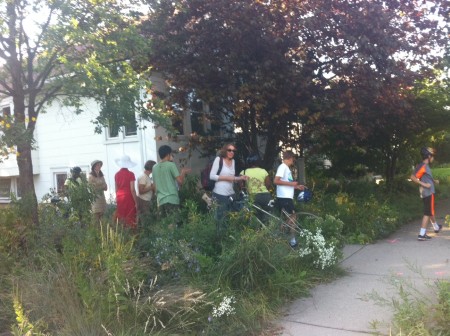 "I requested that the village buy the tree from Possibility Place Nursery, which specializes in native plants that are local ecotypes," says Douglas. Local ecotypes are plants that were propagated from parent plants that have been growing in our specific area for hundreds or even thousands of years. Today, his well-adapted bur oak has a graceful structure and is healthy and vigorous.
"I requested that the village buy the tree from Possibility Place Nursery, which specializes in native plants that are local ecotypes," says Douglas. Local ecotypes are plants that were propagated from parent plants that have been growing in our specific area for hundreds or even thousands of years. Today, his well-adapted bur oak has a graceful structure and is healthy and vigorous.
These three trees form the basis for a savannah ecosystem in his east-facing front yard. On the ground, a mix of sun- and shade-loving plants mingle, including wild ginger, five species of milkweed, pale purple coneflower, three goldenrod species, American beak grass, trout lily and Joe Pye weed.
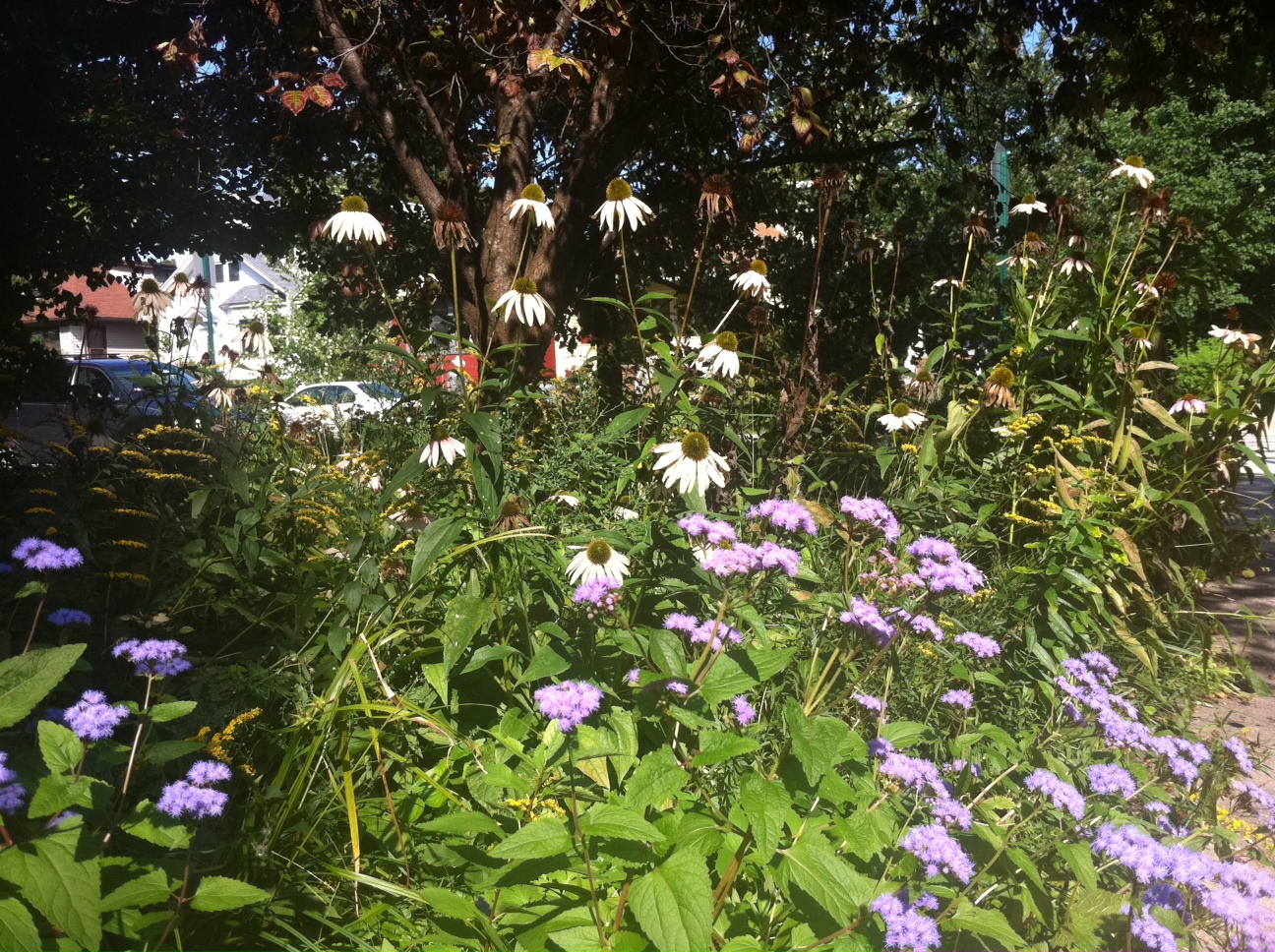 Along the sunny, south side of his home, Douglas has built a prairie in the parkway. Purple prairie clover, several aster species, prairie dock and a variety of grasses and sedges smile at the sun.
Along the sunny, south side of his home, Douglas has built a prairie in the parkway. Purple prairie clover, several aster species, prairie dock and a variety of grasses and sedges smile at the sun.
"I recommend to people who want to plant a native garden that their plant mix include at least 50 percent grasses and sedges," Douglas says. "They provide support to the flowering plants. Grasses and sedges also compete for space and nutrients, so the flowering plants don't get too tall and leggy."
He also adds: "Density and diversity are key to a successful native garden. You want as many different kinds of plants planted very close together. Planting on 12-inch centers, like typical ornamental gardening, leaves room for the weeds."
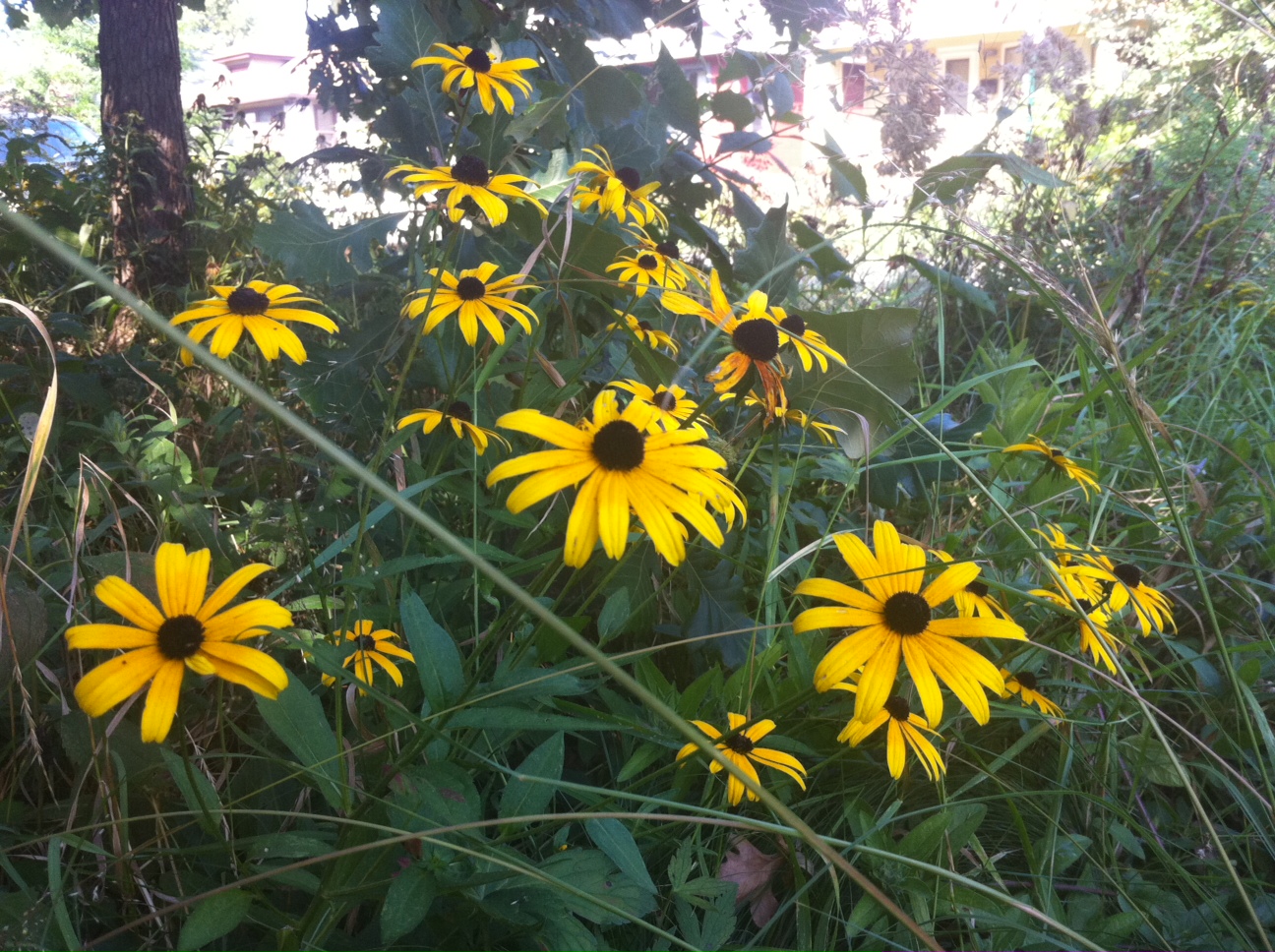 Native habitats need to be burned so they can stay healthy, seeds can germinate and weeds stay under control. Douglas worked with the Village of Oak Park two years ago to change local ordinances. Now residents who go through an application process and obtain proper permits can burn their native landscape yards.
Native habitats need to be burned so they can stay healthy, seeds can germinate and weeds stay under control. Douglas worked with the Village of Oak Park two years ago to change local ordinances. Now residents who go through an application process and obtain proper permits can burn their native landscape yards.
"When I first moved here and started planting natives, everyone else on the block had traditional landscapes," says Douglas. "But today, many more people on my street are planting natives."
And that's a good thing, not only for the birds, bees and butterflies, but for other wildlife, the soil and the people who live here, too.
For more information, you can contact Douglas at 708-763-0953 or dskchien@sbcglobal.net
Elgin High School Students Hold National Biodiversity Teach-in 9/22-26
We here at GCC are inspired by a group of students from Elgin High School who are putting on a National Biodiversity Teach-in. The Teach-in is "virtual," meaning the 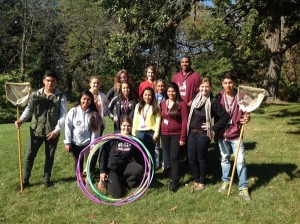 students are hosting a series of webinars with professionals from all over the country September 22 through 26, 2014. This project, "by students, for students," aims at raising awareness about the importance of biodiversity. http://nationalbiodiversityteachin.com/
Biodiversity...it's a term that's not used very much in the mass media, but it's so important to our planet and our own species' future. These kids recognize that, and want to help by putting on a virtual "teach-in" for other students at other schools. Their goal is for 10,000 students across the country to participate.
students are hosting a series of webinars with professionals from all over the country September 22 through 26, 2014. This project, "by students, for students," aims at raising awareness about the importance of biodiversity. http://nationalbiodiversityteachin.com/
Biodiversity...it's a term that's not used very much in the mass media, but it's so important to our planet and our own species' future. These kids recognize that, and want to help by putting on a virtual "teach-in" for other students at other schools. Their goal is for 10,000 students across the country to participate.
Their website says the students were inspired by the story of Martha, the last known living Passenger Pigeon who died on September 1st, 1914. The National Biodiversity Teach-In marks the 100th anniversary of Martha’s death.
More than 15 well-known national and local speakers will cover topics like:
-
Oaks and Biodiversity
-
The Trouble with Balloons
-
Batty for Bats
-
Biodiversity and Resilience
-
Marine Mammals
So here's your Connect to Action mission for this month...if you are a teacher or know a teacher, pass these links on to them and encourage them to learn more:
Website: http://nationalbiodiversityteachin.com/ Email: biodiversityteachin@gmail.com Facebook: https://www.facebook.com/MissMarthaThePassengerPigeon?ref=bookmarks Twitter: https://twitter.com/MissMartha1914
Native Garden Tour This Sunday in Oak Park & River Forest
The news is full of scary stories about disappearing species and shrinking biodiversity. But YOU can help solve this problem by simply planting a few seeds in your yard or community garden that can support beautiful and beneficial wildlife. It's super easy to do, and we've put together an exciting garden tour to teach you. Join us for the Birds, Bees & Butterflies: A Native Garden Tour in Oak Park and River Forest this Sunday, Sept. 7 from 2 to 5:30 p.m. West Cook Wild Ones and Green Community Connections cordially invite you to tour this carefully curated group of 11 private and public gardens. You'll learn how to get started, mix native plants with traditional ones, build a rain garden or even replace your lawn entirely.
For a taste, see brief descriptions of the gardens on the tour. Learn more about the tour and register now.
As in this video, at each tour stop, the gardener or a plant expert will lead you through the garden and teach you more about the beauty and benefits of native plants.
Tour Details
Sunday, Sept. 7
2-4:30 pm Tour: guided bike tour (space limited) or self-paced tour by bike or car
4-5:30 pm Native Garden Fair at Forest Preserve District of Cook County General Headquarters
Suggested donation is $7 for adults. Children welcome - and we've planned special activities at the fair for kids!
and
.
Look for our Tour Stop signs around town and join the tour!
BUTTERFLIES-MOM
Green Living: Enjoy the Birds, Bees & Butterflies on a Native Garden Tour
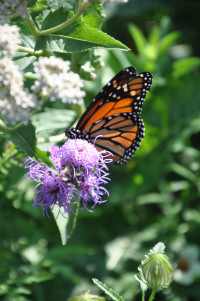 Green Community Connections and West Cook Wild Ones will present the first-ever “Birds, Bees & Butterflies: A Native Garden Tour” on Sunday, September 7, 2014, from 2:00 to 4:30pm. The tour concludes with a Native Garden Fair, from 4:00 to 5:30pm at the Forest Preserve District of Cook County located at the northwest corner of Lake and Harlem in River Forest. REGISTER NOW!
Green Community Connections and West Cook Wild Ones will present the first-ever “Birds, Bees & Butterflies: A Native Garden Tour” on Sunday, September 7, 2014, from 2:00 to 4:30pm. The tour concludes with a Native Garden Fair, from 4:00 to 5:30pm at the Forest Preserve District of Cook County located at the northwest corner of Lake and Harlem in River Forest. REGISTER NOW!
The Birds, Bees & Butterflies garden tour will feature 11 Oak Park and River Forest home and public landscapes that showcase various ways of integrating native plants, including: starter gardens, full-fledged prairie gardens, gardens designed to attract wildlife, those that harness rain water, and plants that invite children's involvement in the garden. Unique plants for shade, sun, rain gardens, clay soil and other applications will also be highlighted. Learn more about the specific gardens here.
A guided bike tour for a limited number of participants will be available. Or design your own self-paced tour with family and friends on foot, by bike, or by car, rickshaw or other vehicle of your choice. A donation of $7 per adult is suggested to help cover costs. Children are free.
Tour organizers want to encourage and support the rapidly growing interest in native plants and their important role in our ecosystem. Here are 5 reasons to join the tour:
- Get inspired and meet others in the community who share an interest in native plants.
- Learn how to get started with native plants if you've never used them before and get tips on maintaining a native plant garden.
- Learn how to integrate native plants into traditional landscaping.
- Find out where you can purchase native plants, and meet professionals who can help you.
- It will be fun!
The tour wraps up with a drop-in Native Garden Fair at the Forest Preserve District of Cook County General Headquarters at Lake and Harlem Avenues in River Forest from 4 to 5:30 p.m. Participants can enjoy refreshments, mingle with fellow native gardeners, learn more about native gardening and where to get native plants, obtain seeds to start now or in the spring, and sign up to be part of the exciting OPRF Wildlife Corridor, which will link Thatcher Woods with Columbus Park through residential native gardens. There will also be games and children's activities.
Free parking is available behind the Forest Preserve headquarters building, accessible from Bonnie Brae Place, one block west of Harlem.
Participants can register and pick up a map on the day of the tour at Cook County Forest Preserve at the northwest corner of Lake & Harlem.
Advance registration and additional details are available HERE.
We are looking for volunteers to help us put on this fun event. The volunteer slots are for various, short activities the day of the event. Please help us make this first-ever OP/RF tour a success!
Sign up to volunteer NOW.
Visit West Cook Wild Ones at www.facebook.com/wildoneswestcook and http://westcook.wildones.org/
Visit Green Community Connections @ www.greencommunityconnections.org and https:/www.facebook.com/GreenCommunityConnections








